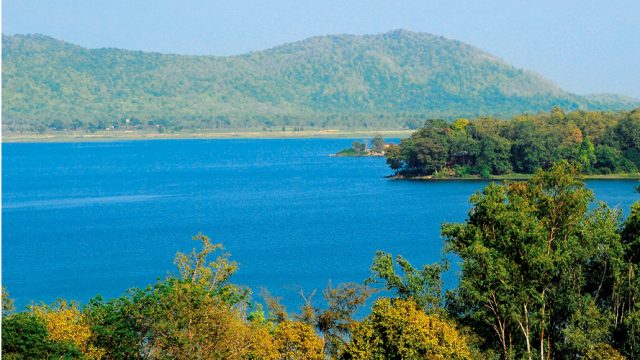Trek the Saat Bahini at Navegaon National Park
Seen the big parks, done that thing, and looking to give those muscles a workout in remote, pristine surroundings? Head to the northeastern corner of the state, to the Navegaon National Park in Gondia district. An area that borders the state of Chhattisgarh, it has a rich history of Gond tribal rule, dating from the 14th century. The Gond kings understood the importance of local communities and agriculture, so the region’s considerable number of waterbodies owes to their genius. Many of these manmade lakes are today home to several varieties of migratory and local birds, making Navegaon quite the birdwatcher’s paradise. Navegaon lake, which legends say was built by a certain Kolu Patel Koli at the turn of the 18th century, is surrounded by seven peaks, known as the ‘saat bahini’. Each of the peaks is home to a shrine, so that may (or may not) be added inducement to scale them along trekking routes. The nearest airport is Nagpur (150km). Stay at the Gateway Hotel in Gondia, approx. 80km from the national park ( from ₹2,499; gateway.tajhotels.com).

Go for a photography tour at Rehekuri Blackbuck Sanctuary
With their beautiful spiral horns and chocolate-coloured (milk or dark, depending on the gender) hides, blackbucks are some of the most charismatic deer species to grace the forests of India. The Bishnoi community of Rajasthan famously endeavoured to protect these creatures, and their efforts have paid off very well. But there’s been good news for blackbucks some distance away too: in the minuscule 2.17 sq km Rehekuri Wildlife Sanctuary, near Pune. Not long ago, it had a small herd of 15-20; today there are over 300 in this little forest. An exciting way to see the deer for yourself is to join a day-long photography tour to the sanctuary. Offered by Thrillophilia, this tour features the presence of a wildlife expert who will introduce you to the sanctuary’s natural treasures—other animal attractions here include chinkara, wolves and Indian foxes. The one-day tour is priced at ₹900 per person, including round-trip transportation from Pune and meals (thrillophilia. com/tours/rehekuri-blackbuck-sanctuary-photography-tour).

Spot a leopard at Sanjay Gandhi National Park
This less-than-alluringly named national park is a unique thing: a bona fide forest, replete with endemic flora and fauna, smack bang in the middle of the country’s busiest, most cramped city. Once occupying a diminutive 20 sq km area and known as the Krishnagiri National Park early in the previous century, the park was expanded several decades later, and renamed the Borivali National Park. Renamed yet again in 1981, the Sanjay Gandhi National Park now sprawls across more than 100 sq km, occupying some 20 per cent of Mumbai’s land area. The park is part of the Western Ghats biodiversity complex and is home to an estimated 1,300 species of flowering plants and a large number of mammals, birds, reptiles, amphibians and butterflies. Leopards are a fairly frequent sighting at the park—and outside it too, as the human residents of the surrounding neighbourhood recount. A natural wonder, SGNP is also a site of considerable historical importance—the beautiful eighth- and ninth-century Buddhist Kanheri Caves are located here. For details on getting there, tour bookings and more, see sgnp.maharashtra.gov.in.

Discover the Nagzira Wildlife Sanctuary
This has to be the state’s best-kept wildlife secret. The Nagzira Wildlife Sanctuary in Bhandara district in Maharashtra is a 154 sq km little gem, snugly ensconced in the hilly tracts of Vidarbha, and home to some of the country’s most exciting—and endangered—creatures. Bhandara district shares a border with that wildlife paradise, Madhya Pradesh, and Nagzira’s woods are teeming with tigers, leopards, honey badgers, sloth bears, mouse deer and many more fascinating animals. It also has over 166 species of birds, many of them attracted to the waterbodies in the area. The sanctuary is part of the proposed Nagzira-Navegaon Tiger Reserve—once this is cast in stone, the tourist hordes will no doubt descend. If you’re looking for a pristine wilderness exploration, go discover this state secret swiftly. The nearest airport is Nagpur (122km). Stay at the luxurious air-conditioned tents at the secluded Nagzira Nature Camp (from ₹6,000; nagziranaturecamp.com).

Jungle walks and treks at Melghat Tiger Reserve
I ts diverse landforms and climate have played an essential role in shaping the history of this southwestern state. Melghat, which translates to the ‘meeting of hills’, is a tiger reserve located near the Maharashtra-Madhya Pradesh border. It shares its location in the Satpura mountain range with several national parks in the neighbouring state. Other than tigers, visitors can expect to spot a number of raptors here in their majestic glory. The many species of animals found here include the tiger, Indian leopard, sloth bear, chital, flying squirrel, dhole and pangolin among many others. An exciting feature of Melghat is the opportunity to jungle walk and trek across many routes inside the reserve; a well-known route is along the riverbed of the Sipna, particularly rewarding for birding enthusiasts. Trekking permits are available from the Conservator of Forests and Field Director, Project Tiger, Melghat, but it’s best to take a guide along. Other trekking routes are along places such as Semadoh, Bandarkahu and Makhla. The most convenient airport is at Nagpur (260km). Accommodation is available at the Kolkas Rest House ( from ₹550; accommodation.mahaonline.gov.in). See melghattiger.gov.in for more.




